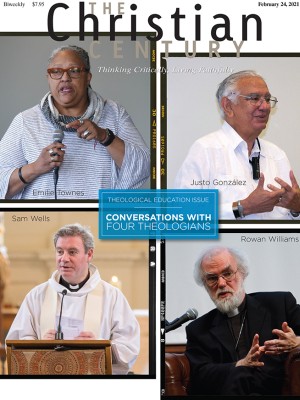Plans for new Tolkien center draw praise, concerns
about proselytization

Fantasy novel enthusiasts want to turn the Oxford house of J. R. R. Tolkien, where he wrote The Lord of the Rings and The Hobbit, into a meeting place for writers, screenwriters, and filmmakers from all cultures and faith backgrounds.
In 1930, Tolkien moved into the house at 20 Northmoor Road. Project Northmoor is a charity created with the purpose of buying the house, currently for sale for roughly $6 million. The project has already raised about $1 million.
The Oxford City Council will not allow the property to be turned into a museum, since it’s in a residential area, but Tolkien fans hope it might become a literary center of discussion and encounter for those who wish to delve deeper into the world of Middle Earth.
Read our latest issue or browse back issues.
The project has come under fire due to concerns that the trustees behind it, who have backgrounds in Christian organizations, might use the house more for proselytizing than promoting Tolkien’s legacy.
According to Project Northmoor founder Julia Golding, in fantasy writing “there should be a space for everyone” to write, regardless of their faith. “Narrowing the world’s cultural voices is the opposite of what we want to do,” she said.
Tolkien was a Catholic and founder of the Inklings, an informal literary group of fantasy writers who gathered to share notes and try out new ideas. Members included Tolkien’s close friend C. S. Lewis, author of The Chronicles of Narnia.
Lewis incorporated Christian themes far more explicitly than Tolkien, who favored a more demure approach to faith in his books. Golding compared the use of faith in Tolkien to the computer graphics effects used to create Gollum in the Lord of the Rings films, which won Oscars for their visual effects. Actor Andy Serkis wore a bodysuit and had dots marked on his face to play the villain during filming, but what eventually appeared on-screen was a computerized version of the character.
Faith in Tolkien feels similar, Golding said: “Despite the rendering and under the surface, you can still feel the faith that’s driving it.”
Project Northmoor’s organizers say there is still space for faith-inspired fantasy novels, though they should not be limited to Christianity and must be grounded in “respect and tolerance” for different worldviews.
Tolkien’s house, once it’s renovated and its garden is restored, will stand as “a center for creativity,” Golding said. After all, she added, one of the great legacies of Tolkien’s writing and the Inklings group is the importance of coming together for a common purpose.
“You cannot defeat evil on your own,” she said, pointing to the ring that in the Lord of the Rings trilogy represents the corruptive evil of power. “You cannot do it on your own. You need mercy and help.”
Or, as another beloved Tolkien character, Samwise Gamgee, once said, “There’s some good in this world, Mr. Frodo, and it’s worth fighting for.” —Religion News Service






